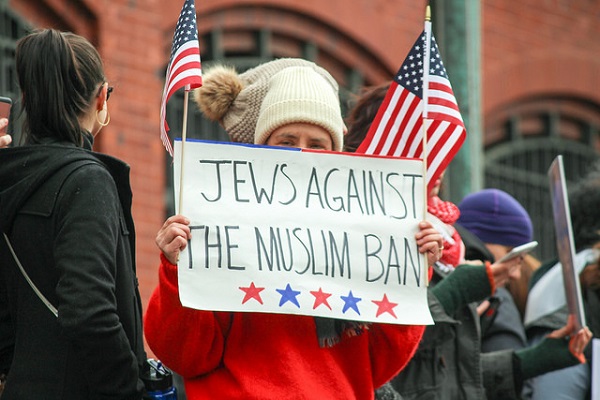As the 2020 election season begins, President Trump’s evangelical endorsers are touting his record on religious freedom to shore up his support among their base. Their strained reading of the issue — for example, citing the First Amendment to justify denying adoption services, health care and public accommodations to LGBTQ families — stands in stark contrast to the simple moral clarity of the gravest threat to religious freedom in the United States today: the Trump administration’s discrimination against Muslims on the basis of their faith.
As I write, the Trump administration is reportedly working on dramatically expanding the Muslim Ban policy, which currently bars Iranian, Libyan, Somali, Syrian and Yemeni people from entering the United States, as well as North Koreans and Venezuelans. We don’t yet know how many additional countries will be added to the list, but advocates expect it to be long. Such a policy would be nothing less than a racist attack on religious freedom, joining a hall of shame alongside the quota systems that excluded Catholic and Jewish immigrants from Eastern Europe in the 1920s. Whether one is directly affected by the ban or not, we are all less free and less safe when banning people because of their religion or ethnicity is even in the realm of political possibility.
Let’s be clear about the truth here. While the administration invokes national security to justify the ban, that’s a paper-thin pretext for discrimination. Early in the 2016 campaign, then-candidate Trump called for “a complete shutdown of Muslims entering the country.” Within one week of taking office, he banned entry from seven Muslim-majority countries. When that was struck down as unconstitutional, the administration replaced two of them with non-Muslim majority countries.We can’t let his enablers get away with un-ringing the bell of bigotry.
It’s noteworthy, and likely no coincidence, that the ban expansion plans are under way on the eve of the 3rd anniversary of Executive Order 13769 — the original Muslim Ban, which President Trump issued on January 27th, 2017.
What followed E.O. 13769 was a spontaneous and historic outpouring of resistance to the administration’s bigotry and authoritarianism. Within 24 hours of the Muslim ban’s announcement, thousands of people from all backgrounds showed up at major airports to protest, to provide aid to stranded Muslim travelers, and to show the world that the Statue of Liberty’s torch still burned. The airports were the scene of the crime. Green card holders with families in the U.S. were detained. Reports of denials of access to legal counsel circulated. It was chaos.
 As a pastor who leads a multi-faith network of faith leaders, I was pleased to see Jewish and Christian symbols and garb among the airport crowds. “Jews against the Muslim ban,” read one sign at Dulles International Airport outside Washington, DC. Interfaith unity in the face of President Trump’s attacks was crucial. Leaving our Muslim family to fend for themselves against discrimination would have been not only an assault on human dignity, but a failure to defend religious freedom.
As a pastor who leads a multi-faith network of faith leaders, I was pleased to see Jewish and Christian symbols and garb among the airport crowds. “Jews against the Muslim ban,” read one sign at Dulles International Airport outside Washington, DC. Interfaith unity in the face of President Trump’s attacks was crucial. Leaving our Muslim family to fend for themselves against discrimination would have been not only an assault on human dignity, but a failure to defend religious freedom.
We need that same spirit of urgency and solidarity, that same commitment to equality and religious liberty, today. The Muslim Ban has devastated families, leaving married couples stranded in different countries for years on end. People have missed the birth of new children and the passing away of elderly family members. Careers and dreams have been derailed. Expanding the ban would increase the suffering of Muslims and flout the Constitution.
When I dialogue with leaders of minority faiths, I hear over and over again that fully inclusive interfaith support is critical to preventing demonization and the denial of religious freedom. I can’t help but ask where Trump-supporting evangelical operatives are. The silence from the Religious Right when Muslims are targets of collective suspicion and collective punishment validates the most hard-hitting charges that they want theocracy — especially when viewed in contrast to their vocal support of policies that carve out special rights to discrimination. Advocating religious freedom only for oneself isn’t a defense of liberty at all, it’s an assertion of privilege.
If and when the Trump administration tries to expand the Muslim ban, I pray that my Muslim neighbors are supported by the full breadth of the faith community. In the parable of the Good Samaritan, Jesus asks the disciples “who is my neighbor?” The answer is not the adherent of one’s own faith, it is the person who shows compassion. Let us be true neighbors by joining together in true defense of religious liberty.












